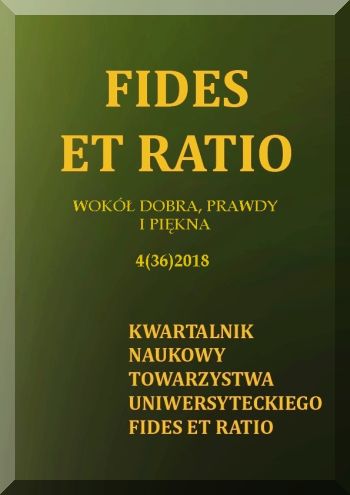Abstrakt
Problem zła był zawsze w kręgu zainteresowań człowieka. Zło jest tym, co dotyka ludzką naturę, z czym człowiek nie tylko poznawczo, ale i egzystencjalnie trudno sobie radzi. Zło, będąc wpisane w dzieje ludzkiego bytowania, jako bytu przygodnego, staje się przedmiotem wyjaśnień filozoficznych, teologicznych i paranaukowych. Próby wyjaśnienia obecności zła dążyły w dwóch kierunkach, po pierwsze, w ukazaniu, że zło jest tylko czymś pozornym, po drugie, w ukazaniu, że zło jest czymś rzeczywistym, pewną formą bytu przeciwstawną dobru. Wśród filozofów nawiązujących do dualistycznej interpretacji spotykamy dwie grupy. Jedni z filozofów, opowiadając się za dualizmem dobra i zła, podkreślają jego czasowość, gdzie walka dobra ze złem kończy się zwycięstwem dobra. Inni natomiast stoją na stanowisku skrajnym, głosząc wieczną obecność i niezniszczalność w świecie dobra i zła. A więc istnieją dwie odwieczne substancje dobro i zło, których bytowaniem rządzą dwie odrębne zasady (dobra i zła). Interpretacje te jednak nie wyjaśniają racjonalnie problemu zła. Zaprezentowane teorie doprowadziły Krąpca do przedstawienia innego stanowiska, traktującego zło, jako bytowy brak, jako relatywny „niebyt”, „choroba” bytu, nieposiadający żadnej natury, a więc samo przez się niepoznawalny. Mimo, że zło nie stanowi żadnego stanu bytowego, to istnieją podstawy, nie w samym złu, ale w bycie, w którym pojawia się brak, do wyróżnienia różnych postaci zła, koncepcji filozoficznych, oraz określenia „przyczyn” zła. Jednak teorie te, traktujące zło, jako bytowy brak nie są przedmiotem niniejszego artykułu. Mimo wielu różnych prób filozoficznego wyjaśniania zła, pozostaje ciągle nierozwiązany problem sensu zła. Pozostaje on dla filozofa tajemnicą. Ostateczne wytłumaczenie znajdujemy w perspektywie religii, która określa sens i wartość cierpienia. Natomiast filozofia stara się odpowiedzieć na pytanie, czym jest i dlaczego istnieje zło?
Bibliografia
Gilson E. (1961), Bóg i filozofia, tł. M. Kochanowska, Warszawa: Znak.
Krąpiec M.A. (1988), Metafizyka. Zarys teorii bytu, Lublin: Redakcja Wydawnictw KUL.
Krąpiec M.A. (1995), Dlaczego zło? Rozważania filozoficzne, Lublin: Redakcja Wydawnictw KUL.
Krąpiec M.A. (1999), Odzyskać świat realny, Lublin: Redakcja Wydawnictw KUL.
Krąpiec M.A. (2000), Filozofia, co wyjaśnia? Filozofia w teologii, Lublin: Redakcja Wydawnictw KUL.
Krąpiec M.A. (2005), Ja - człowiek, Lublin: Redakcja Wydawnictw KUL.
Krąpiec M.A. (2008), Zło, (w:) Powszechna Encyklopedia Filozofii, A. Maryniarczyk,
W. Daszkiewicz, T. Zawojska, A. Szymaniak, t. 9, s. 941–944, Lublin: Polskie Towarzystwo Tomasza z Akwinu..
Krąpiec M.A. (2009), Człowiek, jako osoba, Lublin: Polskie Towarzystwo Tomasza
z Akwinu.
Krąpiec M.A.; Kamiński S.; Zdybicka Z. (2003), Wprowadzenie do filozofii, Lublin: Redakcja Wydawnictw KUL.
Maryniarczyk A., (2007), Racjonalność i celowość świata osób i rzeczy, Lublin: Polskie Towarzystwo Tomasza z Akwinu.
Reale G. (2002), Historia filozofii starożytnej, Słownik, indeksy i bibliografia. Współpraca Roberto Radice, przeł. E.I. Zieliński, t. V, Lublin: Redakcja Wydawnictw KUL.
Tatarkiewicz W. (2001), Historia filozofii, t. 1-3, Warszawa: Wydawnictwo Naukowe PWN.
